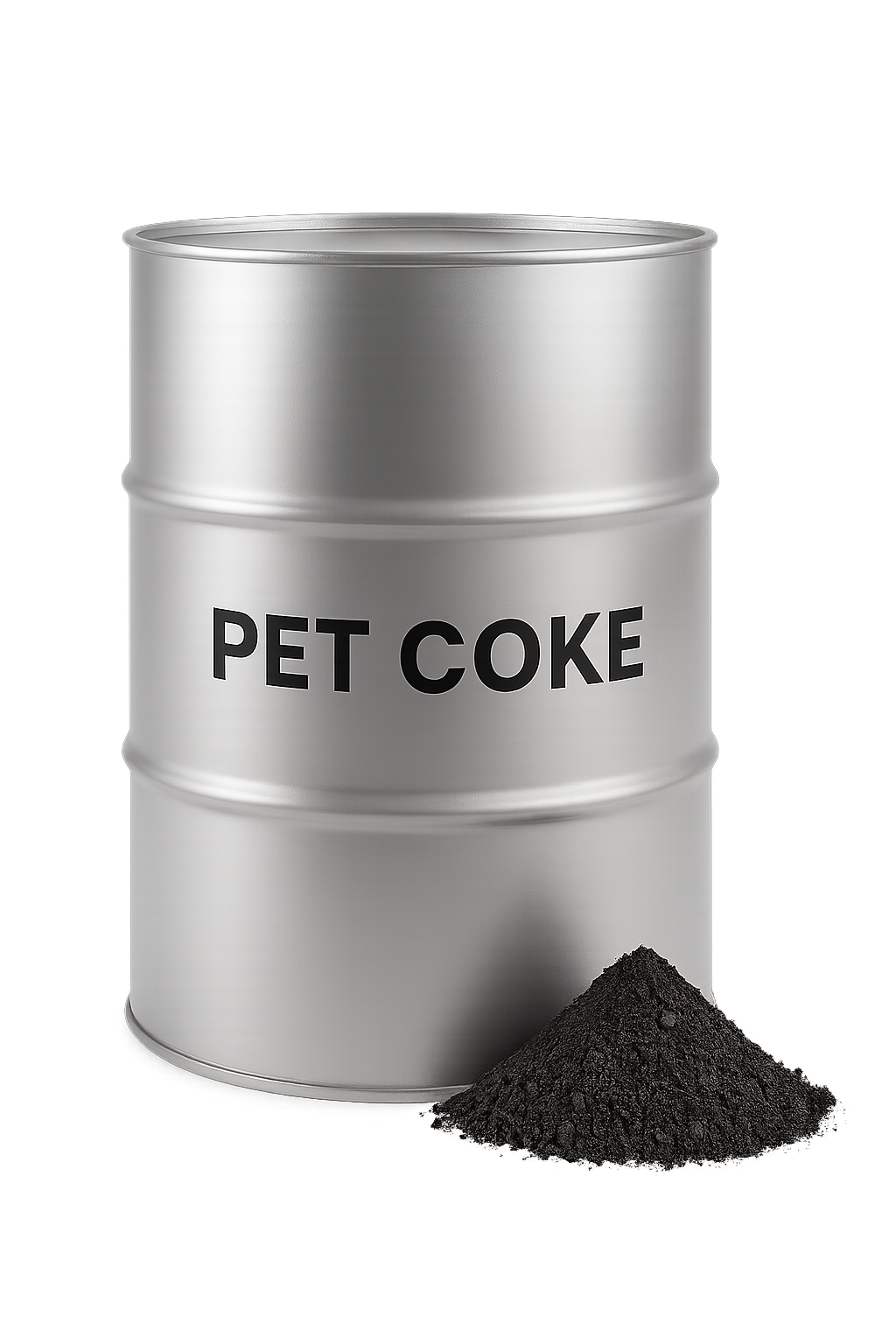
Petroleum Coke (Pet Coke)
Overview
Petroleum Coke (PetCoke) is a carbon-rich solid material derived from the delayed coking process during crude oil refining. It is produced as a by-product when heavy residues are thermally cracked into lighter hydrocarbons. Depending on its sulfur and metal content, PetCoke is classified into Fuel-Grade (used as an energy source) and Calcined PetCoke (used in metallurgical and industrial applications). Its high calorific value and carbon content make it an important feedstock in the energy, aluminum, steel, and cement industries.
Technical Characteristics
- Appearance: Black, solid, porous material (sponge-like or shot coke form)
- Fixed Carbon: 85–92% (ASTM D3178)
- Sulfur Content:
- Fuel-Grade: 3–7%
- Low-Sulfur/Calcined: < 1%
- Volatile Matter: 8–15%
- Ash Content: 0.2–1.5%
- Moisture Content: ≤ 8% (as received)
- Density (Bulk): 0.8–1.2 g/cm³
- Hardgrove Grindability Index (HGI): 35–80 (varies by source)
- Calorific Value: ~7,500–8,500 kcal/kg (~31–36 MJ/kg)
- Metals (Ni + V): 50–1,000+ ppm (higher in fuel-grade PetCoke)
Specifications & Standards
- Classified by ASTM D6376 and ISO 12982 standards for petroleum coke
- Supplied as shot coke, sponge coke, or needle coke (specialty grade for electrodes)
Applications
- Fuel-Grade PetCoke:
- Power generation (coal substitute in cement kilns, power plants, and industrial boilers)
- Steel and cement industry as a cost-effective energy source
- Calcined PetCoke (CPC):
- Aluminum industry as a carbon anode feedstock in electrolytic smelting
- Steel industry for recarburizer in foundries and blast furnaces
- Titanium dioxide (TiO₂) production as a feedstock
- Needle Coke (specialty grade):
- Used in graphite electrodes for electric arc furnaces and lithium-ion battery anodes
Performance Advantages
- High Energy Density: Higher calorific value than coal, providing efficient combustion
- Cost-Effective Fuel: Often cheaper than traditional coal and liquid fuels
- Versatile Industrial Feedstock: Essential in aluminum, steel, and chemical industries
- Carbon-Rich Material: Suitable for further upgrading into calcined or needle coke
Handling & Storage
- Stored in bulk piles or silos under dry conditions
- Prone to dust formation — dust suppression systems recommended during handling
- Non-hazardous but combustible; requires fire prevention measures in storage areas
- Transported via bulk carriers, railcars, or barges
Compliance & Testing
- Quality verified through ASTM and ISO methods:
- Fixed carbon (ASTM D3178)
- Sulfur (ASTM D4294)
- Ash (ASTM D4422)
- Moisture (ASTM D4931)
- Metals content (ASTM D5863)
- Supplied with independent Quality & Quantity (Q&Q) inspection reports (SGS, CIQ, Intertek)
Frequently Asked Questions
1. lobortis augue porta eu. Maecenas eget mauris tristique ?
Praesent aliquet et quam at tempus. Orci var natoque penati magnis disw parturien monascetur ridiculus condimentum pharetra interdum.
2. Sobortis augue porta eu. Maecenas eget mauris tristique ?
Praesent aliquet et quam at tempus. Orci var natoque penati magnis disw parturien monascetur ridiculus condimentum pharetra interdum.
3. Cobortis augue porta eu. Maecenas eget mauris tristique ?
Praesent aliquet et quam at tempus. Orci var natoque penati magnis disw parturien monascetur ridiculus condimentum pharetra interdum.
4. Dobortis augue porta eu. Maecenas eget mauris tristique?
Praesent aliquet et quam at tempus. Orci var natoque penati magnis disw parturien monascetur ridiculus condimentum pharetra interdum.
5. Dobortis augue porta eu. Maecenas eget mauris tristique?
Praesent aliquet et quam at tempus. Orci var natoque penati magnis disw parturien monascetur ridiculus condimentum pharetra interdum.
6. Dobortis augue porta eu. Maecenas eget mauris tristique?
Praesent aliquet et quam at tempus. Orci var natoque penati magnis disw parturien monascetur ridiculus condimentum pharetra interdum.